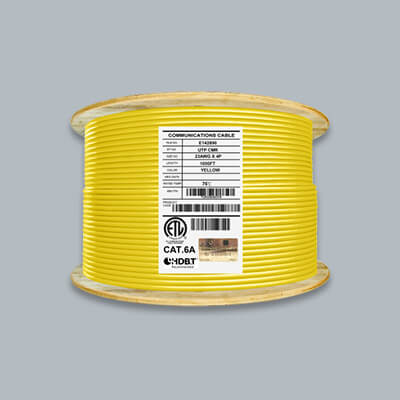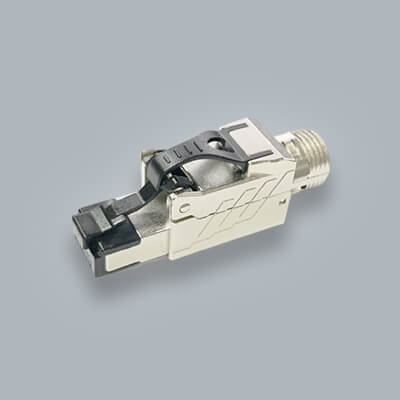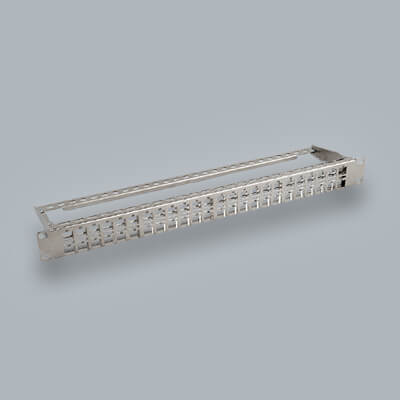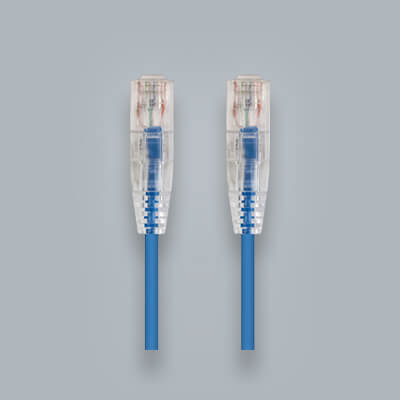Best Ethernet Cable for Gigabit Internet

There might come a time when you want to upgrade your home network or even business network. With a world more connected online than ever it is important that you are able to perform all the daily tasks you want to do. When looking for the best ethernet cable for gigabit internet there are multiple things you want to take in to consideration.
Let's help break these down for you.
What is Gigabit Internet?
First let's start with the actual internet requirements you are looking form. If you've decided that it's time to upgrade your broadband internet service you'll want to understand the capabilities of gigabit internet.
The biggest benefit to upgrading your internet plan to 1 gig is the speed involved. Depending on where your plan is, you can be looking at speeds that are more than 10X the average broadband plan.
Gigabit internet is the internet connection that is able to deliver speeds up to 1 gigabit per second (1 Gbps). This type of performance will be able to deliver you a great gaming experience, seamless computer use, TV streaming or working from home.
This guide should help you visualize the types of activities and speeds required to perform everyday tasks.
| Task | Mbps Required |
|---|---|
| Online gaming | 50 Mbps |
| 4K Ultra HD streaming | 25 Mbps |
| 1080p streaming | 5 Mbps |
| 720p video conferencing | 3 Mbps |
| Broadband | 1.5 Mbps |
| Livestreaming | 0.5 Mbps |
| Screen sharing | 150 Kbps |
| VoIP calling | 80 Kbps |
There is 1000 Kilobits per second for each megabit per second. For reference 80 Kbps is about 0.08 mbps.
The Benefits of Gigabit Internet
As we briefly touched on early in this article gigabit internet has many benefits to it. The first one being the level of increased bandwidth. While on a gigabit internet service you will be able to have multiple users that can use the internet simultaneously without slowing down performance.
This makes this a great choice for families, business, schools and just about any arrangement with many users at the same time.
Another benefit will be the ability to download and upload files at a faster rate than before. If you've ever tried to transfer large files or download anything from the internet you can see where this can come in handy.
Let's take for example uploading images from your phone to your computer. Depending on how many you have you might have upwards of 3,000 plus if its been along time since your upload.
Once those images are on your computer and you wanted to transfer those to a hard drive it could take anywhere from 4 hours to 20 minutes depending on your network speed.
See this chart for reference, this is based on a 3GB file transfer:
| Speed (Mbps) | Time to Transfer (hours) |
|---|---|
| 100 | 27 minutes |
| 500 | 5 minutes |
| 1000 | 2.5 minutes |
This is a baseline reference for a 3GB file. Real word performance might be different depending on each file size.
The third benefit is the way you use the increased speed. If you are working from home, gaming or streaming there will be a level of improvement to your productivity.
You'll have better performance in your video conferences such as Zoom, Microsoft team and the many others of your choosing.
While internet speeds from internet service providers can be a complicated thing to understand it basically boils down to the better speeds you have the more capable you are of performing tasks at a faster and more reliable rate.
Now that we have an understanding of what is gigabit internet let's focus on the cabling portion to achieving these speeds.
Type of Ethernet Cables for Gig Speeds
In your quest for gigabit internet speeds you are going to encounter three common types of ethernet cables: Cat5e, Cat6 and Cat6A.
We will break down each of them for you here.
| Cable Type | Maximum Length of Cable Run (meters) | MHZ | Mbps |
|---|---|---|---|
| Cat5e | 100 | 100 | 1,000 |
| Cat6 | 55 | 250 | 10,000 |
| Cat6A | 100 | 500 | 10,000 |
These are the three choices we recommend for a home and business network looking for gigabit internet speeds.
Cat5e cable is the cable that has been around the longest and is still be used today. This type of cable is great for network speeds that are 1 gig and under. Installing this cable in your home is a nice choice because it can save you money on the cable side and still give you performance up to gigabit speeds.
The thing that might hold you back here is there are now improved versions of cable such as Cat6 and Cat6A that can give you greater performance when it comes to bandwidth and future proof performance.
Cat6 cable is one of the most popular types of cables today because of its ability to double MHz from Cat5e and also give you the ability to future proof your network.
Cat6 cable is rated for 1gigabit (1000 mbps) up to 328 feet which gives you the ability to run it all over your home. You can run this cable in walls, room to room and even outdoors.
Just make sure to select the correct jacket type when choosing your cable.
The added benefit to Cat6 is that it is capable of supporting 10 gigabit speeds up to 55 meters under ideal conditions.. Though this is not guaranteed you can still get this cable to perform up to those speeds. So why this cable is built for gigabit it doubles as a future proofing cable if you have some runs on the shorter side.
Cat6A Cable is the highest performing cable rated for 10 gigabit (10,000 mbps) speeds up to 328 feet. It also doubles the MHz from Cat6 and 10 times from Cat5e.
This is the best choice if you are looking to future proof your network between Cat5e and Cat6.
Cat6A is built for 10Gb speeds in its spec so it gives you future proof performance at longer distances. While it's rated for 10 Gb speeds this still means that it will perform at 1Gb or under just fine.
Which Cable To Choose?
When deciding which cable to choose between these three it's always best to be realistic with your needs.
Things To Consider
You'll want to factor in your budget and also future internet speeds needed. Or maybe you want to be ready when a 40Gb network comes.
Another thing you will want to think about is where your home is at the time of upgrading cable. If your walls are open and free to run wire then it makes sense to go with a higher grade cable to reduce the amount of work needed down the line if you ever wanted to upgrade again.
This also could be the case if you are running wire outside in conduit. If your wire is ran through conduit and is easily pulled then you can use the cable that makes sense right now.
If you are looking to add a couple lines around your home such as under your roof or through your attic, this definitely gives you the opportunity to use a Cat5e or Cat6 cable.
Choosing Your Cable
Cat5e is a totally acceptable cable to still use today with its rating to 1 Gigabit speeds. You'll be able to save on the cost of the cable and leave some room for other types of connectors and devices.
Cat6 is what we typically recommend home user go with for a gigabit network. It advances on Cat5e and will give you the ability for double the frequency. It also improves on crosstalk performance which will reduce signal inference between your wires.
This also include Cat6e cable such as Cat6e riser and Cat6e plenum
Cat6 cables come in many different versions such as riser. plenum, outdoor, CM, stranded and solid which give you the ability to run cable wherever you need to around your home.
The added benefit to using Cat6 will be the ability to get up to 10Gb speeds up to 180 feet (55 meters). By using this wire it gives you some future proofing benefits if you do go over 1 gigabit speeds in the future.
The next cable we recommend if you are looking for absolute future proofing will be Cat6A cable.
Cat6A cable has a higher performance rating than Cat6 and Cat5e which gives you the full 10Gb over 328 feet.
This is a great choice if you want future proofing and also have longer runs in your home.
What Affects Internet Speed
Let's take some time to jump in to some other relevant information in regards to gigabit internet speeds.
It's important to also know what affects internet speed.
Some of the most common occurrence to affect internet speed is:
- Network congestion
- Device performance
- Network Quality
Network congestion occurs when there are too many people using the same network at the same time. Depending on which user is doing what this could severely slow down your network.
Device performance is another factor to keep in mind. Make sure to have all up to date devices that are capable of performing to the speeds you are looking for. If you have an older device of many many years it might be worth looking in to upgrading it.
Another thing kind of out of our control is network quality. This pertains to where the network speeds are coming from. For the most part most popular nationwide ISP plans have a wide ranging infrastructure that is suitable for all use. Sometime you will encounter some down time here and there but most of the time it can be fixed with a simply router reset.
Conclusion
In conclusion, the upgrade to gigabit internet is an important consideration for homes and businesses. Gigabit internet delivers speeds up to 1 Gbps, providing faster gaming, streaming, and work from home capabilities. Ethernet cables like Cat5e, Cat6, and Cat6A play a critical role in achieving gigabit speeds. Cat5e is an older technology that provides speeds up to 1 Gbps. Cat6 is a popular choice that can provide 1 Gbps speeds and future-proofing capabilities up to 55 meters. Cat6A is the highest performing cable rated for 10 Gbps speeds up to 328 feet. The type of cable selected should match the needs and requirements of the network





